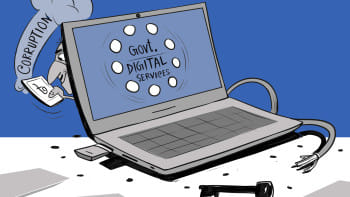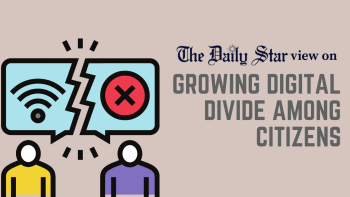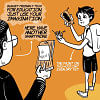How can we have a Smart Bangladesh with high internet prices?

While the government often boasts of its success in bringing the entire country under phone/internet coverage, the situation on the ground is not as rosy as painted. A recent survey by the Bangladesh Bureau of Statistics (BBS) has shed some light into the situation, revealing that only 38.9 percent of people in the country use the internet. While around 63.1 percent of households don't think they need to use the internet, 48.2 percent think that internet services are too expensive for them.
The survey has found a big gap between the urban and rural internet-using households – only 29.7 percent of rural households use the internet, while it is 63 percent for urban households. Among other findings by BBS, what's most significant is the division-wise gap in internet usage: while 54.2 percent households in Dhaka use the internet, in Rajshahi, it is only 19.7 percent.
What we can take away from these findings is that affordability is still a big issue when it comes to accessing the internet. At a time when ordinary people are struggling to cope with the high cost of living, using the internet at high costs is a far-fetched dream for many of them. Understandably, it may be one of the reasons why rural people are using internet less than urban people. And the same reason applies for the people of the northern region where the poverty rate is comparatively higher.
As Bangladesh is said to be transitioning from "Digital Bangladesh" to "Smart Bangladesh", the government needs to seriously look into these gaps, which may be a major barrier to reaching its new goal. Although we must admit that the government made major strides in realising the dream of "Digital Bangladesh" by 2021, it would not be wrong to say that it has failed to reach its goal to a large extent. Although the overall number of internet and mobile phone users has increased over the years – according to BBS, the use of mobile phones at the family level has increased by 9.7 percent in the last 10 years, and their internet usage has also increased by 33.3 percent – that is not enough. The fact that the percentage of internet users is still as low as 39 percent is simply unacceptable.
True, the BBS survey does not reveal the full picture, but it does give us an idea of the overall situation. The government, therefore, must take the findings seriously and find out the real reasons behind the low internet penetration. Making the internet affordable to all and bringing down the prices of necessary devices will go a long way in making our people digitally active. Last but not the least, only making the internet available and affordable to all will not help, unless people are given the necessary trainings – on programming, coding, cybersecurity, etc. – to reap the full benefits of ICT.

 For all latest news, follow The Daily Star's Google News channel.
For all latest news, follow The Daily Star's Google News channel. 











Comments